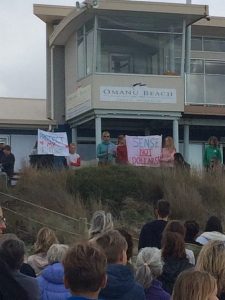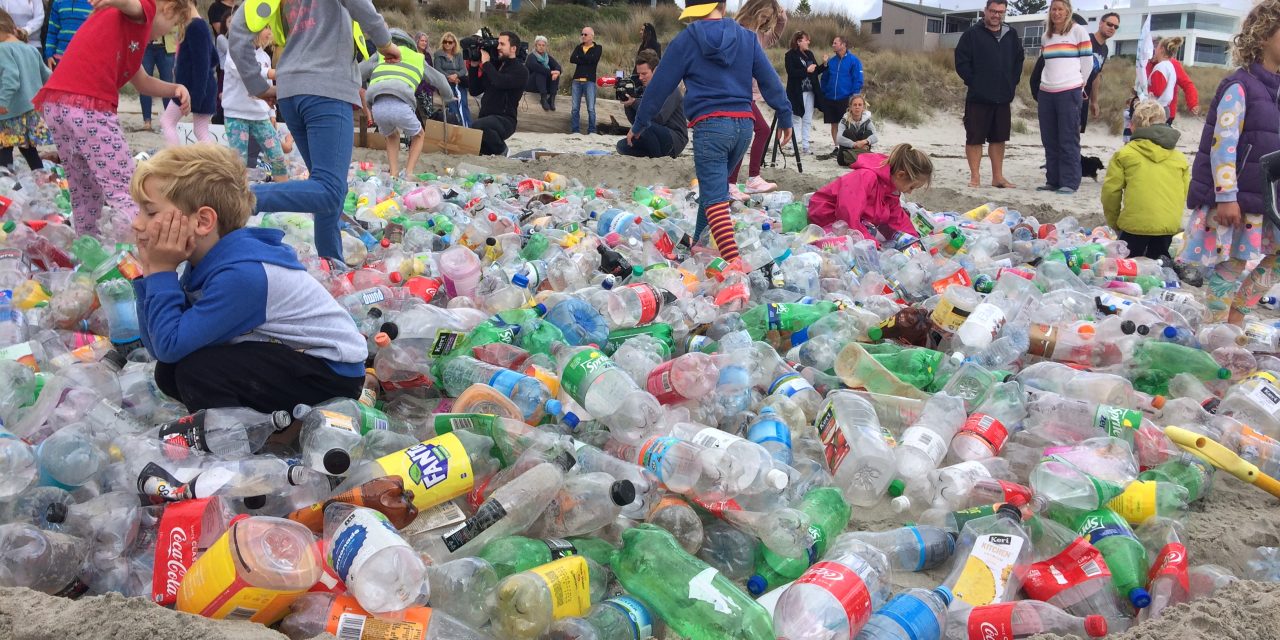Written by Jo Wills / CNCL staff writer, New Zealand
I oppose the expansion of the Otakiri Water Bottling Plant in the Eastern Bay of Plenty (New Zealand) for a number of reasons, but it’s got me thinking about equity of resources and what that means from a humanitarian perspective. At some stage, unless we experience a massive global sustainability shift, water will become the most precious resource we have. We will need it and so will others.
Owned by Chinese company Nongfu and run by Cresswell NZ, the Otakiri operation will be, if they beat the appeals against them by Te Rūnanga ō Ngāti Awa and Sustainable Otakiri, running at 1,800 bottles per minute, according to managing director Michael Gleissner. It’s been said most of this water will be exported to China.
This is a lot of water. 108,000 bottles per hour on the conservative side. It’s assumed this water is being commercialised for a market who chooses to pay for ‘natural spring water’ rather than drink from the tap.
Looking at Nongfu Springs website, they look like a nice company. There are many beautiful images of nature and credits to how they have restored waterways. It also looks like they are there to make money from health products, including our water.
Many people (including myself) are unhappy about this and have been taking to the beach in protest, as with the Omanu gathering on Sunday, 19th May, in Mt Maunganui organised by Greater Tauranga’s Heidi Hughes, Why Waste, and Sustainable Otakiri. This unrest is based on environmental, social and ownership issues.

Protesting the proposed bottling plant
New Zealand spring water is being drawn from the ground, bottled at the plant into single-use plastic bottles, then trucked over seventy kilometres to the Port of Tauranga, shipped to China, distributed throughout that country, consumed and then the bottles left to the whim of the people who have bought them.
From an environmental sustainability perspective, it’s madness.
It can only be based on profit. This explains the need for scale, but as protest organiser Heidi Hughes said at the beach protest, it’s part of the “gold rush water mining industry.” The ‘gold rush’ is making its mark with plans for two more water bottling plants in Murupara (also Eastern Bay of Plenty) as well as similar activity and community opposition in Christchurch and elsewhere.
So how does New Zealand curb this without losing the capacity to share our resources?
The impact of the Otakiri expansion to the Bay of Plenty will not be economic. It will be an increase to our CO² emissions due to the projected 202 truck movements per day and add to our already congested transport infrastructure. We as a region and as a country will wear that cost. The impact of those single-use plastic bottles, unless managed responsibility, has the potential to damage oceans and marine life. This is not to be underestimated at over 2,000,000 leaving the plant per day.
There is also the impact of wastewater. Sustainable Otakiri states that 440,000 litres of treated wastewater will be dumped per day into local waterways, which leads to the Tarawera river. There doesn’t seem to be a lot of impact modeling of those consequences. The truck movements rattling through smaller regional communities also raise legitimate concerns for the safety of children using the same roads to access their schools.
The question of ownership is also huge, Keri Mills, senior researcher at the Policy Observatory, AUT wrote Who Owns the Wai in 2018 and I don’t think much has been resolved since. The Te Rūnanga ō Ngāti Awa appeal against the expansion is based on the kaupapa (values) of kaitiaki (guardianship) and mauri (life force) of the water.
So none of this is good for our community. It only makes sense to the company through an outdated linear economic model and is not the future we want. Even the promised sixty jobs don’t cut it for me. Why are we aspiring to shift work in a factory that creates mountains of waste?
Our government needs to understand these issues and respond to the communities raising them. There needs to a balance which allows a sustainable form of water use in a new commercial market. One which actively understands and practices the cultural values of New Zealand and applies a systemic lens over the entire supply chain.
We can’t turn away from the use of water as an exportable resource. It’s already an essential part our export markets, it takes 15,500 litres to grow 1 kg of beef as highlighted by Love Food Hate Waste, and New Zealand Wine says, “Water is of critical importance to New Zealand’s wine industry for irrigation, frost protection and winery operations.”
Nor should we turn away from water being a humanitarian resource. What we can and should be turning away from, is the pillage of our resources in a way that leaves communities and our environment at risk, when commercial gain is the only driver. This is what the expansion of the Otakiri Springs will deliver.
To learn more or to support Sustainable Otakiri check out their Givealittle page: https://givealittle.co.nz/cause/funding-our-appeal-to-save-our-water


